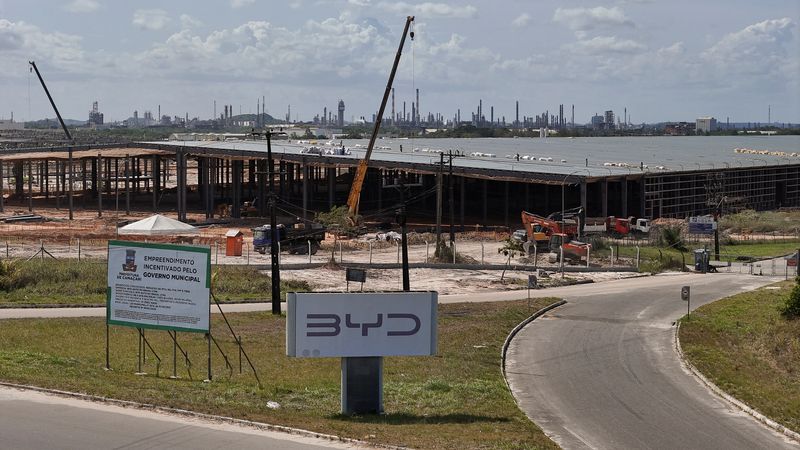Written by Fabio Teixeira
RIO DE JANEIRO/SHANGHAI (Reuters) – Chinese workers at a construction site in Brazil for a factory owned by Chinese electric car producer BYD are victims of human trafficking, Brazilian labor authorities said on Thursday, amid a growing controversy at BYD’s largest company. Overseas market.
BYD and contractor Jinjiang Group have agreed to assist and shelter 163 workers in hotels until an agreement is reached to terminate their contracts, the Brazilian labor prosecutor’s office said in a statement after meeting with representatives of the two companies.
The brief statement did not provide details about how the prosecution reached its conclusion.
BYD and Jinjiang did not immediately respond to requests for comment on Friday. Jinjiang rejected Brazilian authorities’ assessment on Monday that workers at the site in the eastern state of Bahia were working in “slavery-like conditions.”
In a social media post reposted by a BYD spokesperson, Jinjiang said the portrayal of workers as “enslaved” was inaccurate and that there was a misunderstanding in the translation.
BYD initially said it was cutting ties with Jinjiang, but a BYD executive later accused “foreign powers” and some Chinese media of “deliberately distorting Chinese brands and the country and undermining the China-Brazil relationship.”
The Chinese Foreign Ministry said on Friday that it has maintained contacts with the Brazilian side to verify the situation, adding that China protects workers’ rights and requires Chinese companies to operate in accordance with the law.
Brazilian prosecutors said they would meet again with the companies on January 7 and propose a deal.
China’s growing influence in Brazil
A deal could clear BYD and Jinjiang from labor prosecutors’ investigation, but they could still face scrutiny from labor inspectors and federal prosecutors, who have asked to share evidence so “measures in the criminal field can be adopted.” As stated in the statement. He said.
BYD is building the plant to initially produce 150,000 cars as part of plans to start production in Brazil early next year. Nearly one in five BYD vehicles sold outside China in the first 11 months of 2024 were in Brazil.
The factory has become a symbol of China’s growing influence in Brazil and an example of the close relationship between the two countries. BYD invested $620 million to build the Bahia factory complex alone.
Reports of wrongdoing in Bahia could be a major sticking point in bilateral relations.
Brazil has long sought more Chinese investment. But China’s model of transporting Chinese workers to countries in which it invests poses a challenge to local job creation, which is a priority for President Luiz Inacio Lula da Silva.
The investigation also brings unwelcome attention to BYD as it seeks to expand globally after gaining dominance in China, the world’s largest auto market, where it now accounts for more than a third of the electric and hybrid vehicle market.
BYD, poised to overtake Ford (NYSE:) in sales Honda (NYSE:) Globally this year, it has witnessed exceptional expansion at home and abroad, growing its capacity and embarking on a massive hiring spree. The company had nearly 1 million employees as of September.
While it still generates more than 90% of its sales in China, BYD is building passenger car plants in Hungary, Mexico, Thailand, Uzbekistan and Brazil to serve its key overseas markets and increase investments in overseas marketing.
Jinjiang also does construction work for BYD in China, according to records in the Chinese enterprise information database Tianyancha.
A rare Chinese reaction against BYD
The case sparked a rare backlash on Chinese social media against BYD, and opened a debate about workers’ rights, with many netizens saying the living conditions of workers in Brazil were similar to those on construction sites in China.
Brazilian prosecutors released videos of the workers’ living quarters that showed bunk beds without mattresses. They said workers worked extremely long hours, sometimes seven days a week, in conditions that authorities described as degrading.
In Brazil, “slave-like conditions” include forced labor, but also degrading working conditions, long working hours that pose a risk to the health of workers, debt bondage, and any work that violates human dignity.
Prominent Chinese commentator Hu Xijin, a former editor-in-chief of the Communist Party’s Global Times newspaper, echoed Jinjiang’s statement that there may be a misunderstanding, but said Chinese construction companies should improve the living conditions of their employees.

For BYD, the case highlights how it is likely to face more controversy in the future as it emerges as the most powerful electric vehicle brand in China, Hu said.
“The only thing BYD can do is raise its own requirements and keep up with its growing influence in all directions. This is not easy, but BYD should be able to do it.”
https://i-invdn-com.investing.com/news/LYNXMPEB3G033_L.jpg
Source link